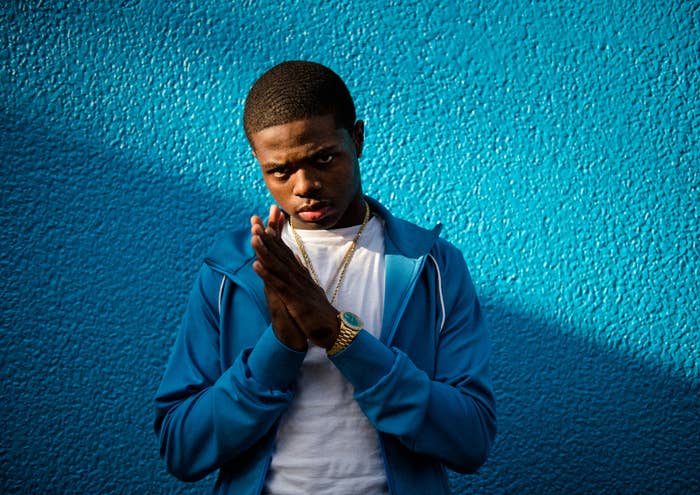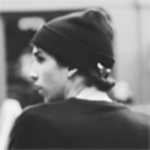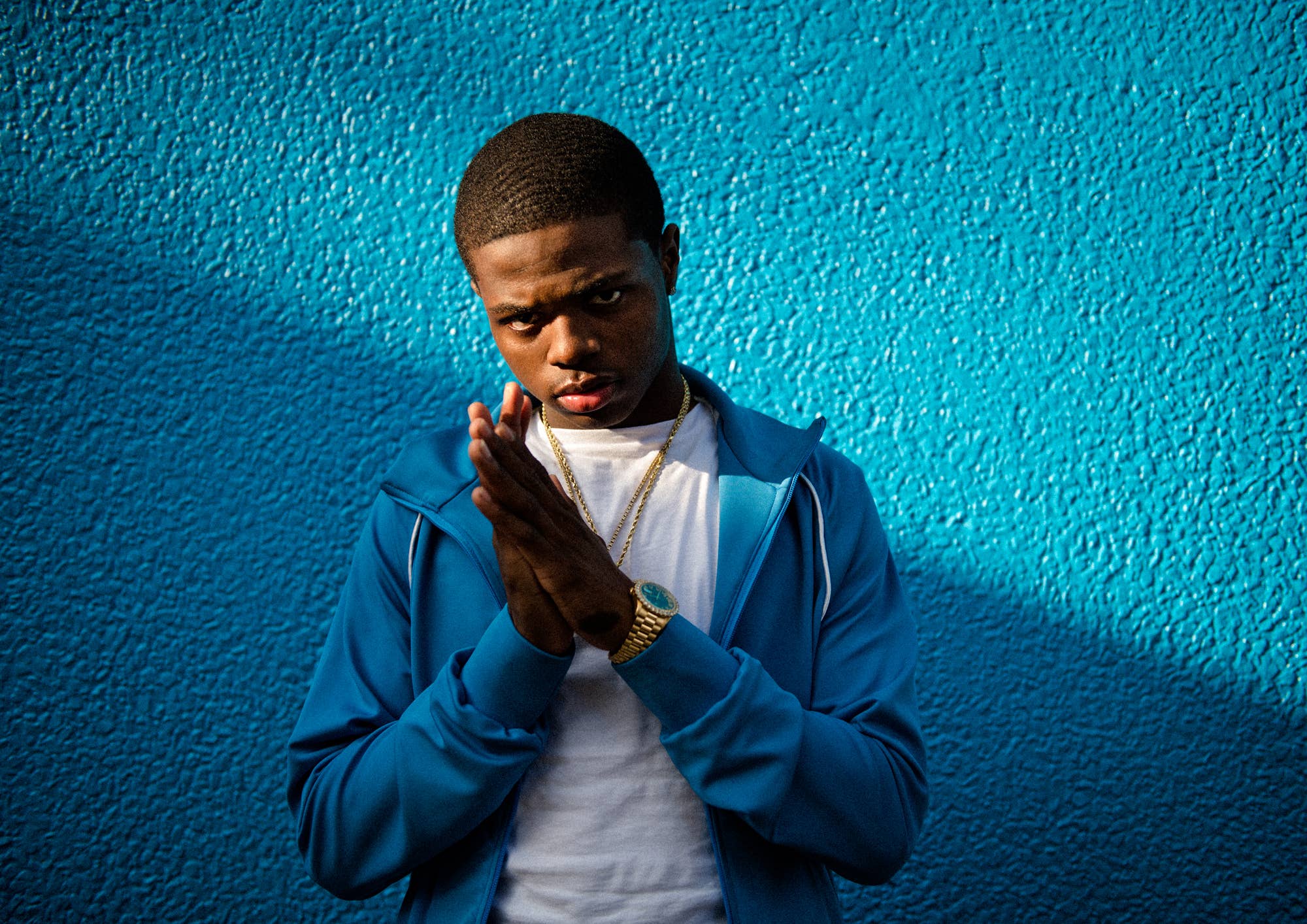
TJ Porter is focused.
Sitting upright at a conference room desk in Midtown Manhattan, the 19-year-old rapper carries himself with the kind of poise and composure you would expect from a much older artist as he carefully explains how he wrote his new single in a way that "the old school and the new school would get it."
Like other rappers his age, Porter often plays with melody and Auto-Tune, and he strays from the boom bap stereotypes placed on New York rappers of past decades. But he also isn't afraid to weave Big L and Dipset references into his rhymes, and if you hang around him long enough, you'll hear him casually drop phrases like, "It's time to bring the real back," in conversation. Pulling bits and pieces from multiple eras of rap, he's making music that appeals to all generations. TJ Porter can write hooks with the best of them, but he's also quick to remind you: "I can do both. I still rap, too."
After recently dropping one of the best songs of 2019 so far, "Harlem," Porter is gearing up for the release of his debut album, Voice of the Trenches, which will arrive on June 28. "I feel like I'm the voice of the trenches because I'm just talking for people—not only in the trenches, from where I'm from, but from where everybody's from," he notes. "I rap about everyday struggles that everybody goes through."
Complex spoke with TJ Porter about the album, his thoughts on New York rap, what it was like playing his first show, and more. The interview, lightly edited and condensed for clarity, is below.
One of my favorite songs on the album is "Harlem." How did that come together?
I was in a studio in L.A. I was working with Nascent, Corbett, and Beat Butcher. I wanted a song about where I'm from. I wanted it to feel like the aura of Harlem. They came up with the beat, and then I wanted to put it a certain way so the old school and the new school would get it.
Why did you want this to be a single for the album?
I didn't even think that was the single, to be honest. Everybody around me did. So, you know, you just have to go with what the people want.
I rap about everyday struggles that everybody goes through. I feel like the people connect with me. I feel like I'm the voice for them.
You named your debut album Voice of the Trenches. Why does that name fit the feel of the album?
I started calling myself the voice of the trenches, like, a year and a half ago. I said it in a song, and then I just ran with it. I feel like I'm the voice of the trenches because I'm just talking for people—not only in the trenches, from where I'm from, but from where everybody's from. I rap about everyday struggles that everybody goes through. I feel like the people connect with me. I feel like I'm the voice for them.
Is that mainly what you're trying to get across on the whole album?
Yeah. Every song on here got a message.
Is that important to you?
Yeah, because a lot of people be talking about nonsense in their songs.
Have you always had that mentality?
I've always been like that. Even if you go back to 2014 or 2015, there was always a message in my songs. Even if the message was negative, there was always a message.
Everyone puts albums together in different ways. Some artists record a collection of unrelated songs, and others try to put together some kind of cohesive message. How did you put this album together?
I was just creating music, and then we just picked—I'm not going to say the best songs, but the most cohesive to go through the whole album. Everything was flowing, and I feel like it's a good, strong project.
You mentioned that you recorded "Harlem" in L.A. Is that where you recorded all these songs? Did you make them all at the same time?
Actually, the whole album switched. I recorded "Harlem" in L.A., and I recorded two other songs in New York: "Father Figure" and "Eight Laws." Other than that, the rest of the songs came in Atlanta. I went down to Atlanta to Means Street Studios for a week or so, and I just locked in. Then I came back with a whole new project. The project wasn't going to be this. We already had 14 different songs. When I went to Atlanta, it changed the trajectory of everything.
If you put me in a room with people like me, I'm gonna still stand out. There's just something about me.
What is a TJ Porter studio session like?
I don't record with a lot of people in there. But, say I go to the studio five times out of the week, I make sure I go and do work first. So on the last two days, if I want to have a lot of people, I bring a lot of people. But I've got to make a certain amount of songs before I bring a lot of people.
You're calling this your debut album, which carries a little extra weight from other releases. What are you hoping this album does for you?
I feel like it's going to boost me. It's going to show everybody: This kid is talented. Not to compare myself to A Boogie, but you see the rush he had when he dropped his first tape. I feel like it is going to happen similarly to that.
What is one important thing you want people to know about this album?
Nothing is made up. Everything is authentic. Every song on here is a piece of me.
You're signed to Def Jam, and you're a part of this new wave of artists they have. What is the biggest thing you've learned since signing?
You can't drop music when you want. You gotta ask a lot of lawyers. There are a lot of business aspects you gotta learn that I didn't know about. I was so used to just dropping music when I wanted to.
Seeing the rap camp thing that Def Jam did was cool. Do you think being with all those guys pushes you to go harder? Is there friendly competition between the other artists on the label?
I try not to compete with anybody. I just do my own thing. I see everybody working. I've always had the same work ethic. Sometimes I get a little sidetracked, but I'm always working hard, so I don't focus on nobody else.
In high school, you were focused on basketball. Then I know you started taking music more seriously, and it seemed like things happened pretty quickly. Can you talk about that transition?
I was always doing both since I was little. I had stopped rapping, and then when my friend died, I started making music again, because that is what he wanted me to do. I was short, but I was still nice in basketball, so basketball was slowing up for me, anyway. Then I broke my ankle during my last year of high school, so I stopped playing for a little while. Then I started going full-fledged with music and just locked in.
Did you find success quickly?
To everybody else, it looked like it was quick. But it wasn't quick. People only see the strides you're making, but they don't see what you were doing to make those strides. To everybody else, this was quick. But to me, it's like, y'all don't know the back and forth I had to do, going to Brooklyn and mad different places and studios. That was just to start, before I was even making any kind of music like this. They don't see all the small things.
I want people to know that everything is authentic, because a lot of stuff in this game is fake right now. It's time to bring the real back.
It's clear at your shows, and seeing you in person, that you have some level of natural star power, even at this early point in your career. Where do you think that comes from? Were you always the popular kid growing up? Have you always had that confidence?
I'm not going to say I was the most popular, but I was always the person that everyone wanted to be around. I didn't have the most money or none of that, but I just had charisma about me. I'm myself. If you put me in a room with people like me, I'm gonna still stand out. There's just something about me.
Looking back on the first time you ever performed, do you think that side of it came easier to you than it does to most?
Hell no. I was scared. I wasn't even talking. I was mad quiet next to Wayno and L. I thought if I did a bad performance that they were going to quit being my management. I swear. I wasn't talking to nobody or nothing. I was sitting there like this. They were like, "Yo, what's wrong with you?" I'm like, "Nothing. I'm chilling." Then I kinda did my thing. But now I love performing.
How did that change happen? Did someone help you out with advice for how to perform?
Nah. L and Wayno always tell me I've gotta rehearse and all that. But rehearsal is just for me to take it easy on stage and keep my breaths up. But other than that, I just love performing now. I see the lights go on, I see people cheering for me, and I just like that feeling. It comes naturally to me now.
We started this conversation by talking about "Harlem." How has being from New York shaped who you are as an artist?
It played a big role. But I feel like a lot of people put a ceiling on all New York rappers. I'm just trying to go into every market so I don't have a ceiling on my career. I am really focused on trying to break that chain. They always say New York people don't reach out when they see another person coming up. But I give people shoutouts and all that, if I see you doing your thing.
For a long time people expected a certain thing from New York rappers. I think that has changed some, because guys like you and A Boogie have more of a melodic sound. Do you still feel pressure to fit into the old mold of a "New York rapper"? Or is that not really a thing anymore?
Nah. I just grew up around all the old-school rappers. I know most of them. People might see everybody doing this melodic thing, but I can do both. I still rap, too. So they can't jump into the pocket I can jump in. But I can go jump into their pocket at any time. So I just try to stay level-headed and balanced with both.
Who are some of the other New York rappers you're fucking with?
I fuck with everybody. But I don't consider everybody a "rapper," you feel what I'm saying?
You're about to put out our debut album, and lots of people are finding out about you for the first time. What do you want people to know about you right now?
I want people to know that everything is authentic, because a lot of stuff in this game is fake right now. It's time to bring the real back.




